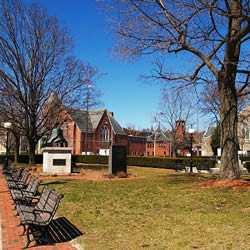Massachusetts has definitely emerged in 2013 as a state to watch in the casino proliferation race that is being fought in many regions in the nation.
At the end of the year, Massachusetts gaming officials will be awarding three licenses for Las Vegas-style resort casinos in addition to one slots only gambling parlor.
The competition for each of the licenses has been fierce, with deals being struck on all sides while the process has dominated statewide headlines for months.
One casino looks to employ disabled workers
One of the contenders for the lone slots parlor license to be handed out by the state, the Cordish Cos. subsidiary PPE Casino Resorts MA LLC, has reached an agreement with a group that trains and places disabled workers in jobs.
That organization, called The Arc of Opportunity, has been established in central Massachusetts for some four decades, this according to the Sentinel and Enterprise newspaper.
PPE is looking to build its slots parlor in the town of Leominster, the second-largest city in Worcester County. Though it did not reveal what types of employment the disabled staff members would be hired on to do, it would likely be front of house as well as off the floor.
Joe Weinberg, who is a managing partner of The Cordish Cos., touted the deal, saying, “Our agreement with Arc is consistent with our commitment to reach out to all populations in the region, including our citizens with disabilities, to provide employment opportunities at Massachusetts Live!”
Representatives from The Arc of Opportunity were equally thrilled at having reached the deal.
“This is a win-win agreement. PPE Casino will be able to access a qualified and enthusiastic workforce and know that they are giving back to the community by opening the door to employment for the people we support,” said Mary Heafy, who serves as the group’s president and CEO.
Companies seek to make plans appeal to residents
The licensing process in Massachusetts requires that companies wishing to apply for a license must first come to what is called a host agreement with the city (or cities) where the property will be located.
Once that agreement has been struck, state law dictates that a public referendum be held to approval the host agreement, which deal with issues like increased traffic, crime, problem gambling, taxation, and any other infrastructural, civic, or social issues that could potentially arise due to casino development.
As such, gaming companies have worked hard to broker deals that appeal to both municipalities and residents. Agreements like the one reached between PPE and The Arc of Opportunity serve make the idea of casino development more attractive to those who may be opposed to gambling expansion by offering employment opportunity for underserved community members.
PPE’s host agreement is set to go to a vote on September 24.
Hard Rock out of contention after failed vote
To date, only one company has failed to win in a public referendum. That firm is Hard Rock, whose plan to put a new casino in the town of West Springfield failed at the polls earlier this month.
Meanwhile, other noted gaming companies have had better luck. Wynn’s plan to put a $1.2 billion casino modeled on its Macau resort – also a design that will be employed in Pennsylvania if the company wins licensing approval there – was overwhelming sanctioned by voters in the town of Everett back in June.
Penn National and MGM have also gone to the polls and come away with wins.

